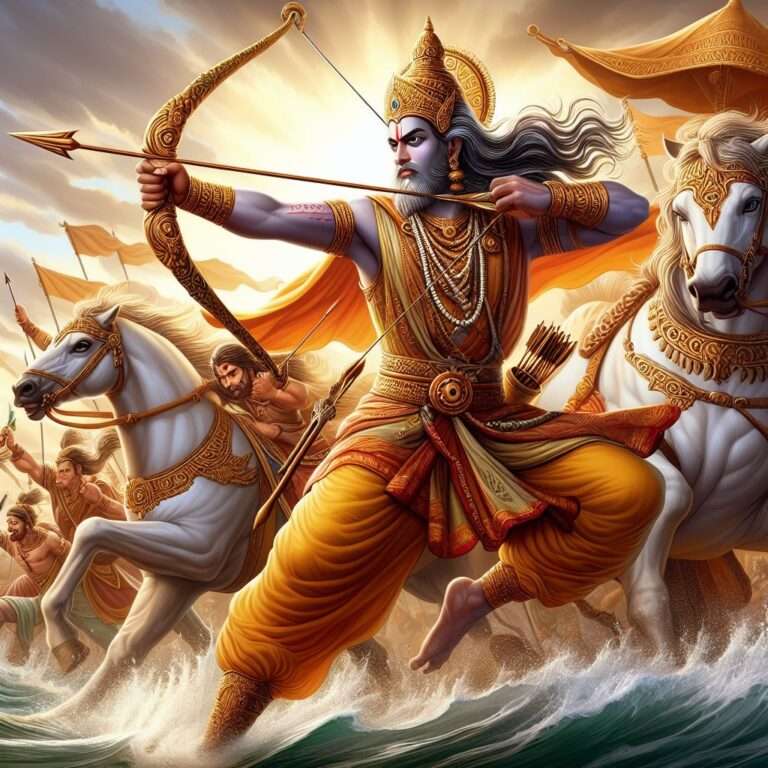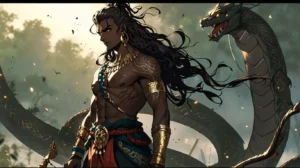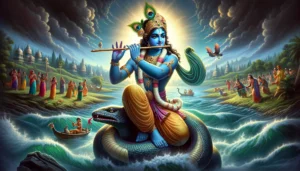In the grand epic of the Mahabharata, few characters command as much respect and admiration as Bhishma, the illustrious son of King Shantanu and Ganga. Known for his unwavering commitment to duty, unparalleled martial prowess, and boundless wisdom, Bhishma’s life and legacy stand as a beacon of virtue and righteousness. Throughout the epic, Bhishma’s character embodies the complex interplay of loyalty, honor, and sacrifice, leaving an indelible mark on the fabric of Indian mythology and literature. In this detailed exploration, we delve into the multifaceted persona of Bhishma, unraveling the layers of his character and the profound impact he had on the events of the Mahabharata.
Early Life and Lineage
Bhishma, originally named Devavrata, was born to King Shantanu of Hastinapura and the river goddess Ganga. His birth was marked by divine circumstances and a solemn oath taken by his father, which led to his lifelong commitment to celibacy and service to the throne of Hastinapura. Raised in the royal household, Bhishma received rigorous training in the martial arts, governance, and ethics, under the guidance of illustrious teachers like Parashurama. His lineage is traced back to the illustrious Bharata dynasty, renowned for its valor and nobility, further enhancing his stature as a revered figure in the epic.
Quote: “A son of Shantanu by Ganga, I am known among men by the name of Bhishma.” – Bhishma (Mahabharata)
This quote signifies Bhishma’s acknowledgment of his lineage and the circumstances of his birth, underscoring his identity as the son of King Shantanu and the river goddess Ganga.
Traits and Attributes
Bhishma was characterized by his unwavering adherence to dharma (righteousness) and his unshakeable resolve to uphold his vows. His commitment to truth, integrity, and loyalty earned him the title of “Bhishma,” meaning “the terrible” or “the formidable,” signifying his formidable prowess on the battlefield. Despite possessing unmatched martial skills and the ability to alter the course of battles single-handedly, Bhishma’s true strength lay in his humility, wisdom, and selflessness. His noble attributes endeared him to both allies and adversaries, establishing him as a paragon of virtue in the Mahabharata.
Quote: “None, O chief of Bharata’s race, can slay me in battle, for I shall slay no one, even if my foe should discharge at me his fiercest weapons.” – Bhishma (Mahabharata)
This quote illustrates Bhishma’s unwavering commitment to his vow of lifelong celibacy and non-aggression, declaring his invulnerability on the battlefield due to his refusal to harm others.
Triumphs and Tribulations
Bhishma’s life was marked by a series of triumphs and tribulations, each shaping his character and legacy. From his unwavering loyalty to Hastinapura and his pivotal role in the establishment of Dhritarashtra as king to his valiant exploits on the battlefield, Bhishma’s feats were legendary. However, his greatest trial came during the Kurukshetra War, where he found himself torn between his duty to the throne and his love for his family. Despite his allegiance to Hastinapura, Bhishma’s heart ached at the sight of the fratricidal conflict, leading to his vow of lifelong celibacy and his decision to fight on the side of the Kuru dynasty.
Quote: “Alas, with what powers of body and mind have I been endowed. With what courage have I been gifted, and with what intelligence.” – Bhishma (Mahabharata)
This quote reflects Bhishma’s inner turmoil and sense of duty, acknowledging his formidable abilities and the heavy burden he carries as a warrior torn between conflicting loyalties.
Moral Dilemmas
Throughout the Mahabharata, Bhishma grappled with numerous moral dilemmas that tested the very core of his character. His oath of celibacy and his loyalty to Hastinapura often placed him in precarious situations, where he had to navigate the complexities of duty, loyalty, and personal ethics. One such instance was his role in the abduction of Princess Amba, which led to her tragic fate and Bhishma’s lifelong guilt. Despite his remorse, Bhishma remained steadfast in his commitment to his vows and his duty as the patriarch of the Kuru dynasty, showcasing the moral complexity of his character.
Quote: “It was ordained by fate that I should be born in the race of the Kurus. That destiny I must fulfil. My mother’s command also must be obeyed by me. For these reasons, I will fight.” – Bhishma (Mahabharata)
In this quote, Bhishma expresses his unwavering resolve to fulfill his destiny and uphold his duty, even in the face of moral dilemmas and personal anguish.
The Great War
Bhishma’s role in the Kurukshetra War, the epic climax of the Mahabharata, was pivotal. As the commander-in-chief of the Kaurava army, Bhishma displayed unmatched valor and strategic acumen on the battlefield, leading his forces with unwavering determination. His prowess was such that even the greatest warriors of the Pandava army found it difficult to challenge him directly. However, Bhishma’s adherence to his vow of lifelong celibacy rendered him invulnerable to defeat, prolonging the conflict and causing immense suffering to both sides. Despite his loyalty to Hastinapura, Bhishma’s actions during the war were fraught with inner turmoil, reflecting the tragic consequences of his choices.
Quote: “O grandsire, I ask you, even if I am to be slain by you, still I desire that you should fight with me with all your prowess. It behooves you not to do any act that might be against morality or virtue.” – Arjuna to Bhishma (Mahabharata)
In this exchange, Arjuna appeals to Bhishma’s sense of honor and righteousness, urging him to fight with full vigor and integrity, even if it means facing his own defeat.
Legacy and Impact
Bhishma’s legacy extends far beyond the events of the Mahabharata, leaving an indelible mark on Indian culture and literature. His unwavering commitment to duty, his sacrifice for the greater good, and his steadfast adherence to principles of righteousness continue to inspire generations of readers and scholars. Bhishma’s character serves as a timeless reminder of the complexities of human nature and the eternal struggle between duty and personal ethics. His life and teachings offer valuable lessons in leadership, integrity, and selflessness, resonating with audiences across cultures and generations.
Quote: “In the Kuru dynasty, virtue itself hath been slain. Upon the earth a great destruction hath occurred. In consequence of the disappearance of virtue and the ascendency of sin, the world hath been afflicted with unrighteousness.” – Bhishma (Mahabharata)
In these profound words, Bhishma laments the decline of virtue and righteousness in the world, highlighting the tragic consequences of moral decay and the importance of upholding ethical principles in the face of adversity.


